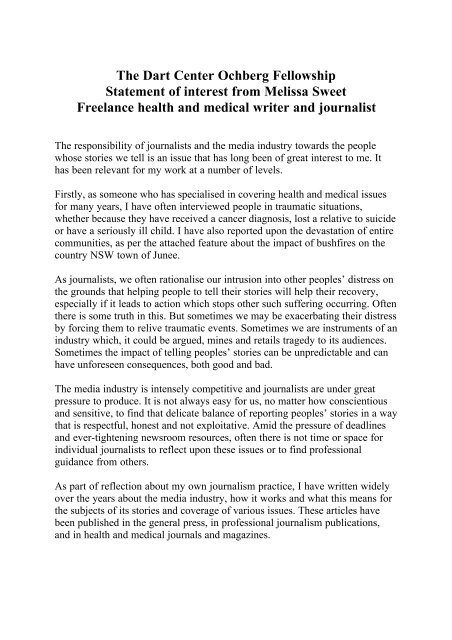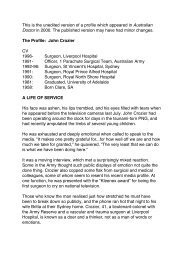The Dart Center Ochberg Fellowship Statement of ... - Melissa Sweet
The Dart Center Ochberg Fellowship Statement of ... - Melissa Sweet
The Dart Center Ochberg Fellowship Statement of ... - Melissa Sweet
You also want an ePaper? Increase the reach of your titles
YUMPU automatically turns print PDFs into web optimized ePapers that Google loves.
<strong>The</strong> <strong>Dart</strong> <strong>Center</strong> <strong>Ochberg</strong> <strong>Fellowship</strong><br />
<strong>Statement</strong> <strong>of</strong> interest from <strong>Melissa</strong> <strong>Sweet</strong><br />
Freelance health and medical writer and journalist<br />
<strong>The</strong> responsibility <strong>of</strong> journalists and the media industry towards the people<br />
whose stories we tell is an issue that has long been <strong>of</strong> great interest to me. It<br />
has been relevant for my work at a number <strong>of</strong> levels.<br />
Firstly, as someone who has specialised in covering health and medical issues<br />
for many years, I have <strong>of</strong>ten interviewed people in traumatic situations,<br />
whether because they have received a cancer diagnosis, lost a relative to suicide<br />
or have a seriously ill child. I have also reported upon the devastation <strong>of</strong> entire<br />
communities, as per the attached feature about the impact <strong>of</strong> bushfires on the<br />
country NSW town <strong>of</strong> Junee.<br />
As journalists, we <strong>of</strong>ten rationalise our intrusion into other peoples’ distress on<br />
the grounds that helping people to tell their stories will help their recovery,<br />
especially if it leads to action which stops other such suffering occurring. Often<br />
there is some truth in this. But sometimes we may be exacerbating their distress<br />
by forcing them to relive traumatic events. Sometimes we are instruments <strong>of</strong> an<br />
industry which, it could be argued, mines and retails tragedy to its audiences.<br />
Sometimes the impact <strong>of</strong> telling peoples’ stories can be unpredictable and can<br />
have unforeseen consequences, both good and bad.<br />
<strong>The</strong> media industry is intensely competitive and journalists are under great<br />
pressure to produce. It is not always easy for us, no matter how conscientious<br />
and sensitive, to find that delicate balance <strong>of</strong> reporting peoples’ stories in a way<br />
that is respectful, honest and not exploitative. Amid the pressure <strong>of</strong> deadlines<br />
and ever-tightening newsroom resources, <strong>of</strong>ten there is not time or space for<br />
individual journalists to reflect upon these issues or to find pr<strong>of</strong>essional<br />
guidance from others.<br />
As part <strong>of</strong> reflection about my own journalism practice, I have written widely<br />
over the years about the media industry, how it works and what this means for<br />
the subjects <strong>of</strong> its stories and coverage <strong>of</strong> various issues. <strong>The</strong>se articles have<br />
been published in the general press, in pr<strong>of</strong>essional journalism publications,<br />
and in health and medical journals and magazines.
2.<br />
As outlined in my CV, I have recently published a book based on the murder<br />
<strong>of</strong> Dr Margaret Tobin, who was the director <strong>of</strong> mental health services in South<br />
Australia at the time <strong>of</strong> her death in 2002 (Inside Madness, Pan Macmillan).<br />
Researching and writing this book was an extremely traumatic process, both for<br />
myself and for some <strong>of</strong> Margaret’s friends and family members. By telling<br />
Margaret’s story, I was also telling the stories <strong>of</strong> those close to her. I had many<br />
difficult times negotiating the ethical issues involved, and turned to the writing<br />
<strong>of</strong> other journalists, particularly the US writer Janet Malcolm, to help with this.<br />
My experience researching Inside Madness also made me more aware <strong>of</strong> the<br />
suffering <strong>of</strong> some journalists as a result <strong>of</strong> their work. While much attention<br />
has been paid to the impact on high-pr<strong>of</strong>ile journalists such as war<br />
correspondents, the impact <strong>of</strong> the more everyday jobs <strong>of</strong> journalism may be<br />
overlooked. I spent some months in court attending the trial <strong>of</strong> the deregistered<br />
psychiatrist who was eventually convicted <strong>of</strong> Margaret Tobin’s<br />
murder. During that time, a number <strong>of</strong> specialist court reporters told me <strong>of</strong><br />
how their work had adversely affected their own psychological well-being.<br />
Some had spent many weeks in court listening to the grisly details <strong>of</strong> the socalled<br />
Snowtown murders, and this had left a pr<strong>of</strong>ound mark upon them.<br />
Another reason I am applying for this <strong>Fellowship</strong> is that I have been working<br />
as a freelancer for several years. Freelancing is not for the faint-hearted; you<br />
sacrifice income and security for the freedom <strong>of</strong> being able to assert some<br />
control over your work and pr<strong>of</strong>essional standards. It can also be isolating. I<br />
would welcome the opportunity to meet other journalists and to share some<br />
pr<strong>of</strong>essional exchange <strong>of</strong> ideas and issues.<br />
If successful in winning this <strong>Fellowship</strong>, I would accept a responsibility to<br />
share my learnings with colleagues and relevant audiences. A variety <strong>of</strong> outlets,<br />
from general news media to health, medical, and journalism publications might<br />
be interested in running articles. In particular, it is likely that there would be<br />
interest from the British Medical Journal (which has a huge international<br />
audience, not only amongst health and medical pr<strong>of</strong>essionals, but also amongst<br />
the media) and <strong>The</strong> Walkley magazine, which is distributed to all members <strong>of</strong><br />
the Media, Entertainment and Arts Alliance. I have previously written for both<br />
these publications about ethical issues related to media reporting.<br />
Thank you for considering my application.<br />
<strong>Melissa</strong> <strong>Sweet</strong><br />
11 July 2006










